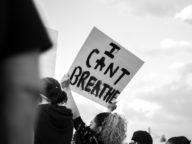In October 2019, a video of Brandt Jean extending forgiveness towards the former Dallas police officer who had shot and killed his brother, Botham Jean, went viral on social media.
For Brandt, forgiveness looked like both releasing feelings of anger and hostility to his killer, but also extending mercy and wishing them to be released from prison. Brandt’s response was praised and applauded by the Christian community, but his mother, Allison Jean had a different response. She called for justice, desiring her son’s killer to remain in prison, and also pushed for police reform—and yet her desires went largely unnoticed by most of the media.
Why were people quick to applaud the act of forgiveness, while negating the pursuit of justice? How can we so casually dismiss the cries for justice by those who have been historically and presently marginalized and oppressed? In today’s society where there is so much injustice and hurt, why might our natural response be to turn a blind eye toward the suffering that’s occurring? Do we unintentionally hurt others when we shine a spotlight exclusively on forgiveness?
The culture of justice among Christians
Speaking as someone who was adopted from China, but was raised in a dominantly white culture, I notice in the white, North American evangelical culture, there is a tendency to focus almost exclusively on God’s more “friendly” attributes (see Psalm 86:15; Jeremiah 31:3; and Ephesians 2:4-5):
- forgiveness
- love
- mercy
- grace
These are often seen as opposed to God’s more “intimidating” attributes (see Deuteronomy 32:4; Psalm 11:7; and 1 Samuel 2:2):
- justice
- righteousness
- holiness
When those are mentioned, it is often with a narrow application. Those qualities are often applied in an individualistic sense, between a person and God.
While it is true that a person’s own sin requires a response of God’s justice––either judgment or atonement in Jesus––the Bible also indicates that God cares about justice, holiness, and righteousness in a communal sense, between groups of people. For example, God’s people are to show his justice by caring for those who are most vulnerable to abuse and mistreatment, people such as:
- the poor
- the oppressed
- the widow
- the fatherless
- the foreigner
How can we better understand the concepts of forgiveness and justice between people? There is a need for Christians—and all people—to dig deeper into these important ways of life.
What is true forgiveness?
Asking for forgiveness from others can look different, depending on whether we were:
- the person in the wrong
- the one who was wronged, or
- a third party hoping to mediate between others
In any case, it can be easy to view forgiveness as simply formulaic words that are exchanged in response to wrongdoing: “I’m sorry!” This can make forgiveness look more attractive than justice since forgiveness is then reduced to a moment of “forgetting” what was done. Unfortunately, this shallow understanding of forgiveness is akin to slapping on a Band-Aid without first addressing the severity of the wound.
Forgiveness is an ongoing decision, rather than a momentary feeling. Forgiveness, as modelled to us in the Bible, is the choice to release wrongdoing that’s been committed against us. It may be possible to do this work in a moment, but often it’s a process of choosing to forgive over and over again. Thus, forgiveness may not be as attractive—or as easy—as we think. But it is good: it takes the wrongdoing out of our own hands and places it into God’s, and in doing so, we are putting our trust in the one who is perfect in justice. Forgiveness trusts that no matter how large the injustice, God is big enough to carry our pain.
What is true justice?
In contrast to a Christian subculture’s understanding of forgiveness, justice can be an uncomfortable topic, as it involves judgment and repercussions for those who have done wrong. It sees what is evil and does not minimize, excuse, tolerate, or ignore it. It also means that the offender receives appropriate consequences for their actions (Proverbs 21:15). It requires action to change, reform, and repent. It requires accountability for those who have wronged others and requires their wrongdoings to be made right.
There are other reasons that justice might be not as appealing as forgiveness. Firstly, it’s confusing for everyone. It’s applied in so many different ways, in so many different contexts. It’s hard to know what justice should look like in any particular situation, and many end up disagreeing on what ought to be done. Focusing on forgiveness looks easier.
Secondly, Christians may have a unique stake in emphasizing God’s love and forgiveness. Ignoring the importance of justice may seem to make Christianity more accessible to non-believers since it inoffensively brushes over how much justice cost God. And honestly, it can be easy to utilize God’s love and forgiveness as an excuse to shy away from harsh truths and ugly realities. However, justice isn’t only hard. It’s also good and beautiful, even in the mess of the process, because it takes what is wrong and makes it right. So when Christians pursue justice, they help to make Jesus attractive.
Striving for justice is not easy, but then again, neither is following Christ (Matthew 16:24). Jesus never promised that following him meant that we’d be living a life of comfort and safety. Maybe there are some causes of injustice that are easier for you to get behind than others. However, as believers, we don’t have the liberty of being selective about which causes of injustice we take up. While we aren’t a designated group’s “saviour,” as Jesus is the only way to true salvation (John 14:6), we are to care for those who are being oppressed, including those who aren’t followers of Christ.
This can make forgiveness and justice seem like two concepts at the very opposite end of the spectrum of each other. However, I’d argue otherwise: they belong together.
How do forgiveness and justice go hand-in-hand?
Both forgiveness and justice are demonstrated to us in the gospel message of the cross, and powerfully showcase God’s love for us in spite of our brokenness.
How so? Justice is perfectly demonstrated in the fact that there are grave consequences for our sin: eternal separation from God. However, because God loves us so much, he willingly took the consequences of our sin upon himself through Jesus’ death on the cross. The cross was God’s fulfillment of justice against our sin, placed on Jesus instead of us.
Another equally important trait that God exhibits is mercy. Mercy was present at the cross because Jesus died so that we wouldn’t have to face the consequences for our sin; however, his mercy in no way negates the fact that God is perfectly just. Jesus willingly took on the consequences of our sins so that justice could be served and mercy displayed, all at the same time. To understand what forgiveness looks like helps us to better understand our need for justice.
If God was only just in nature, then each of us would be condemned for eternity with no hope of ever obtaining salvation, but if God was only forgiving in nature, then Jesus’s sacrifice would be meaningless and there would be no consequences for our sins. Thankfully, because he is perfect, he is equally just and forgiving. Yet, if we fail to recognize the gravity of our sin, we fall into a trap with three sharp prongs:
- over-emphasizing God’s forgiveness and mercy
- watering down the need for justice, and/or
- minimizing the sacrifice that was needed in order to atone for our sins
It is one thing to say we need justice, but in fact, justice is far more than mere words.
Why should we care about justice?
We should care about justice because God loves justice and hates injustice (Isaiah 61:8).
It is very much part of his nature because he is a holy God. The definition of holy has two aspects:
- “to be set apart from”
- “perfect in goodness and righteousness”
Since God is holy, he is the standard by which we are to live by, based on who he is and who he says he is. Furthermore, God calls us to practice justice because justice is a good thing (Micah 6:8).
God is the ultimate judge. He will deliver perfect justice, and his justice is not separate from his righteousness. At times, it may seem that God is unjust when it looks as though he is refusing to intervene. I’ve certainly thought that myself. C.S. Lewis also had a similar predicament. In his book Mere Christianity, he writes,
“My argument against God was that the universe seemed so cruel and unjust. But how had I got this idea of just and unjust? A man does not call a line crooked unless he has some idea of a straight line. What was I comparing this universe with when I called it unjust?”
Our society can tell us that the lives of all human beings are valuable and of immeasurable worth, but they cannot explain as to why that is. As believers in Jesus, we know that the reason why human lives are so valuable and of immeasurable worth is because human beings were created in the image of God, and therefore, are to be treated with dignity and respect because of whose likeness we bear (Genesis 1:26).
Whenever we hurt or violate another human being, we are also hurting God, because we are dehumanizing, degrading, and disregarding someone who is created and loved by him. Additionally, God calls us to take care of those who are oppressed and/or vulnerable in society because he hears their cries for justice, and this should compel us to act or speak out against injustice (Luke 18:7-8). When we fail to enact justice, we fail to love others as God loves us (Isaiah 1:17; Zechariah 7:9; John 13:34).
The reason why human lives are so valuable and of immeasurable worth is because human beings were created in the image of God.
Additionally, when coming from the perspective of a third party, justice is not about us; it’s about others. When we seek justice, it is not for our own personal gain, but rather because we love others and strive to see that their voice and experiences are rightfully heard and that those who have committed injustice towards them will face the consequences of their actions.
To want justice for others is to love them with a self-sacrificial love that doesn’t put our own personal interests or comforts before theirs, but instead is willing to lay one’s own life down for them (John 15:13). It is walking alongside them in the valleys and hardships of pursuing justice, and rejoicing with them in the victories and triumphs when justice is rightfully served (Romans 12:15). We should want justice because we love others. Love is the defining factor of both forgiveness and justice.
How to pursue justice and forgiveness together
Pursing justice and forgiveness together looks like:
- personal reflection and educating ourselves
- listening intently to the voices of those who have been silenced
- speaking up and calling out the injustice that we know is happening
- modelling Christ’s actions towards those who are hurting
Personal reflection and educating ourselves are great places at which to start when pursuing justice. We can also be listening intently to the voices of those who have been silenced for much of history, without getting angry, defensive or making assumptions about their experiences (James 1:9). We can also speak up and call out the injustice that we know is happening, with honesty and personal humility. You don’t have to work for a non-profit organization or be an activist to speak about injustice. We all most likely have friends, or at least know someone, who has been affected by unjust acts.
I would also like to make the argument that as followers of Jesus, how we do justice should be modelled after Christ’s actions towards those who are hurting. Find opportunities to serve them if possible; what and how that may look like will very much depend on the situation. Praying that justice would be enacted and that it would be done well, is something that we can also do as believers. I’ve included a short prayer below that you can pray:
God, break my heart for what breaks yours. There are so many people who are experiencing injustice, and I weep with them. God, you hear the cries of the oppressed, and I lift their voices up to you now. I pray that you would enact justice in these situations, knowing that you are a just God and that you will carry out your will in your perfect timing. Even though I don’t always understand, I know that you are sovereign over all, and I trust how you will work and I know that you are at work, and I desire that there would be victory over the evils of injustice. Thank-you.
In your name I pray, Jesus.
Amen.
Lastly, if we want there to be justice, we have to pursue it from a place of love and mercy. There is a famous passage in 1 Corinthians that talks about love, and I specifically want to note verses six and seven: “Love does not delight in evil but rejoices with the truth. 7 It always protects, always trusts, always hopes, always perseveres.” (1 Corinthians 13:6-7).
If we aspire for there to be justice, we must avoid getting caught up in the following:
- personal vengeance
- self-righteous pride
- wrongly condemning victims
Instead, we need to offer these blessings to others in our pursuit to do what is right and just:
- love
- compassion
- mercy
- grace
- humility
- forgiveness
“Yet the Lord longs to be gracious to you; therefore he will rise up to show you compassion. For the Lord is a God of justice. Blessed are all who wait for him!”
Isaiah 30:18
"*" indicates required fields
Share this!
About the Author





